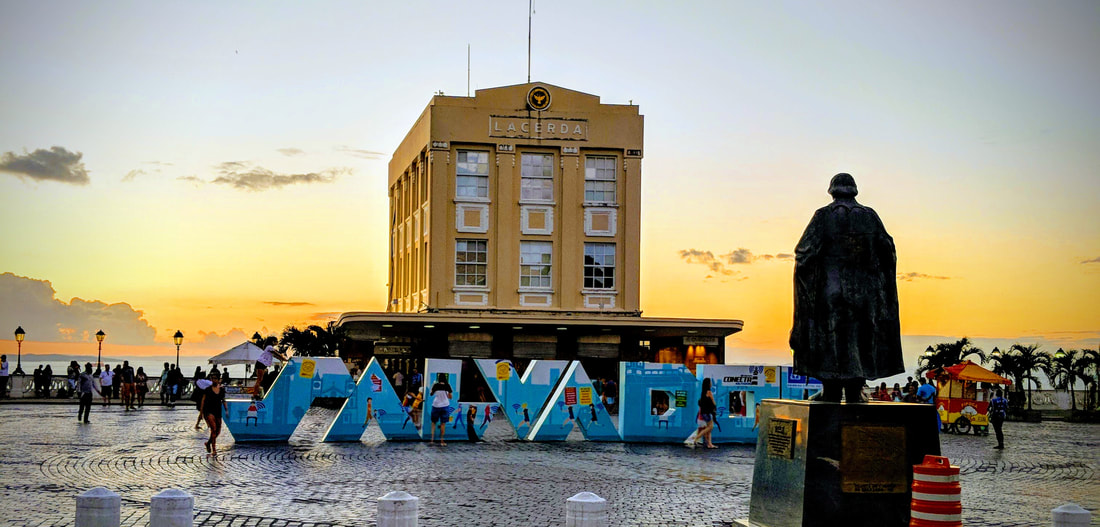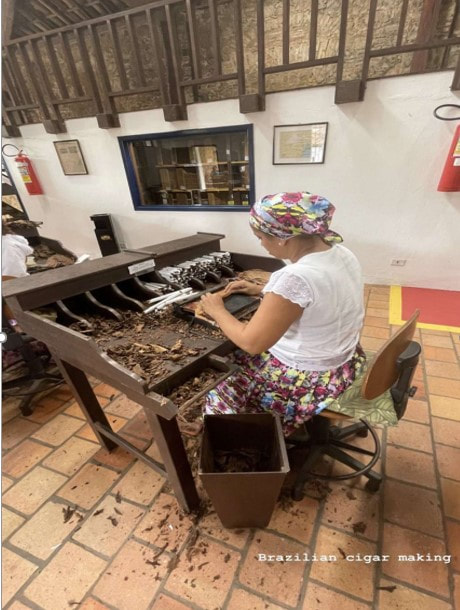|
By Ryan Engel and Zach Jans As we end our time here in Brazil, we are going to share some of our final observations and connections. We have made several connections from what we have seen and learned here to what we learned early this semester. However, we will continue to share a couple that we thought really stood out. One lecture that stood out to us was the lecture by Major Denice. She has been a police officer in Brazil for 32 years, and she spoke to us about discrimination against women in Brazil. From her lecture, one thing that stood out to me was that the highest a woman can get in the police ranking is the third highest. No woman moves past that ranking. Right away, we thought it was crazy that a woman who has been a cop for 32 years is stuck in the same ranking and cannot go any higher. As we thought about it more, we realized that this idea significantly connected to the subtopic that we researched (violence against minorities). From our research earlier in the semester, there was a quote that greatly related to this note. The quote stated, “policewomen clearly saw themselves as discriminated against, as women, in their police careers—they could cite endless accounts of male counterparts who ‘didn’t think they could handle the tougher cases’ and so on” (Hautzinger, 2002, 247). The connection here is that male police officers do not take the women in their field as seriously as themselves. Therefore, this leads to women being stuck in the lower rankings of the police force. This exemplifies how women are discriminated against in the workplace and in society in Brazil. Another lecture that stood out to us was a lecture regarding Trans Rights in Brazil. The biggest fact that was reiterated in this lecture was that murders of trans people happen most in Brazil. Along with that, our speaker believes that this issue is largely due to a systemic issue in the country and not an individualistic issue. It was interesting to hear that because we are having a lot of doubts about our system here in the US regarding racial discrimination and gun violence. However, a quote from my research earlier in the semester backs the statement of trans violence being a systemic issue. It states that “it is important to note that there was limited information on perpetrators, primarily due to the underreporting of these crimes. This happens due to the inefficiency of Brazil's criminal justice system, leading to a lack of effective measures to address homophobia” (Mendes, Furtado Passos da Silva, 2020, 1713). This quote highlights a great example of how the system is failing society here in Brazil. The underreporting and limited information on these crimes towards trans people just sends a larger message that the government and those in charge do not prioritize these specific minorities. Another experience that we found interesting was our day trip to Cachoeira. While in Cachoeira, our visit to the Danneman cigar factory stood out to me because there were aspects that seemed to go against the norm of Brazil and also aspects that seemed to follow the gender norms in Brazil. When thinking back to the readings, I feel as if this quote by Silva comes to mind when thinking about the cigar factory. “The Oral History of the participants reveals that the dominance over women, position as head of the family, family provider, and exacerbated sexuality are social attributes of masculinity” (Silva, et al., 2020). I feel as if this quote is challenged a bit when it comes to the cigar factory. As men are usually the providers and women tend to stay home, every employee making cigars in the factory was a woman. This is something you typically do not see in Brazil. Although females were the ones working and producing the cigars, there was still an aspect that followed the gender norms in Brazil. While all the females were at work and doing the manual labor, the person overseeing the whole process and making sure everything was running smoothly was a male. The man was not doing any of the dirty work and was there just doing what seemed to be “monitoring”. This followed most of the theories that we read about before coming to Brazil and showed the male dominance that all articles talk about. A quote from one of the readings that reminded me of this dominance was, “Even when women have paid work activities, and they have a superior financial situation than that of their partners, to the point of promoting the livelihood of the home, the role as head of the family usually remains as belonging to the man” (Silva, et al., 2020). This quote seems fitting because the females may have a paid work activity, but there is always a man in a superior power. Works Cited Hautzinger, Sarah. Rep. Criminalising Male Violence in Brazil's Women's Police Stations: From Flawed Essentialism to Imagined Communities 11. No. Vol. 11. 3. Carfax Publishing, 2002 Mendes, Wallace Góes, and Cosme Marcelo Furtado Passos da Silva. Rep. Homicide of Lesbians, Gays, Bisexuals, Travestis, Transexuals, and Transgender People (LGBT) in Brazil: a Spatial Analysis, 2020. Silva, et al. “Social Attributes of the Male That Incite the Violence by Intimate Partner.” REBEn, 2020.  Ryan Engel is a sophomore at CSB/SJU, pursuing a major in Accounting/Finance with a minor in Communications. He is originally from Green Bay, Wisconsin. Ryan enjoys broadening his horizons by traveling and learning about different places, people, and cultures. He is also a sports fanatic, including playing soccer at Saint John's University. He looks forward to exploring a new part of the world while studying abroad in Brazil in May 2022  My name is Zach Jans and I am finishing my sophomore year at SJU. I am currently an Elementary Education and Political Science double major. I am from St. Michael, MN. A big reason I like learning about teaching and why I am excited to be a teacher is that I look forward to finding ways to motivate all students and be a role model for young students. I have always been involved with sports, playing baseball and basketball my whole life, until college. I stay active in intramurals. Outside of school, I like to golf, hangout with friends and family, and spend time at my cabin.
0 Comments
Leave a Reply. |
Archives
June 2024
Categories
All
|


 RSS Feed
RSS Feed
